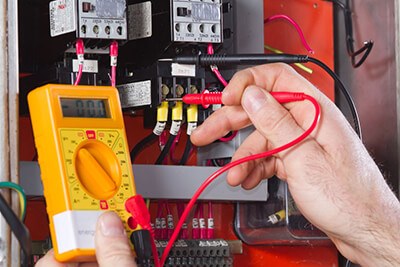
Household traditions and myths are often passed down from generation to generation. Many of these myths may have been established in the past when houses weren’t as modern with advanced technologies as they are today. There might be many myths that you and your family may believe in or know about that may not be true today. Understanding common household electrical myths can keep you informed about the safety of your home.
Only Old Wiring Can Go Bad
A common myth is that only old wiring in the walls of your home can go bad. This myth encourages those who live in newer houses to feel more comfortable with their wiring. However, the truth is that any wiring can go bad at any point. Wires are subject to being overloaded or affected by rodents chewing on them that can lead to accidental fire damage. While old wires specifically can eventually wear down and become a hazard in the home, any type of wire can go bad and need to be replaced. You should regularly check the outlets and appliance cords to ensure they don’t have any damage. The best way to minimize electrical danger in the home is with consistent checks and regular professional maintenance from a qualified technician.
Low-Voltage Shocks Are Harmless
You may occasionally plug in your phone or lamp at night and suffer a small shock that startles you but doesn’t otherwise cause any harm. While a small electrical shock can be brushed off as a harmless jolt, there may come an instance where the shock causes lasting damage. The electrical current in outlets can be dangerous enough to stimulate involuntary muscle reactions that can cause bruises, seizures, and even death. Parents often must watch their children around outlets to keep them safe, but adults should be just as wary of accidentally getting an electrical shock. Always avoid live wires and call a technician if an electrical emergency has occurred in the home.
Rubber and Wood Will Keep You Safe
If you’re a fan of working on DIY projects or participating in other electrical hobbies, you may pull on your rubber gloves to keep yourself safe from unpleasant shocks. While it’s true that pure rubber is a fantastic insulator, many rubber products like shoe soles and gloves are made with additives that can compromise that insulation. These additives can often act as conductors, which puts you in more danger. Wood is also often a good insulator but can quickly become a conductor when wet. Electricity is a powerful and dangerous form of energy that should only be managed by professionals who are experienced and have the proper tools to handle it.
Electrical Cords and Power Lines Are Always Insulated
You may believe that the power lines making their way down your street are insulated and safe due to the many birds that you see perch on them. However, many power lines usually aren’t installed with insulation. If some do have insulation, this insulation can deteriorate over time due to the changing weather. Occasionally you may come across a fallen power line due to the weather or even a vehicle accident. If you see a powerline lying on the ground, call a professional who knows how to properly handle it.
Extension cords used in the home may also not be as insulated as you believe. When purchasing cords, it’s important to check whether they are insulated if you plan on using them outdoors. You should opt to purchase a more insulated and heavier weighted extension cord than a thin, cheaper extension cord. Do so will offer you more safety from weather and prolong the life of the extension cord.
Breaker Tripping Harms the Home
It’s easy to trip a circuit breaker during the holidays when extended family is in the home using more appliances and electricity than normal. Many believe that a tripped breaker leads to lasting damage to the home’s electricity system. While the loss of electricity can suddenly leave you in an unsettlingly dark, silent room, you shouldn’t worry about any lasting damage from a tripped breaker. The breaker often trips to avoid overloading the wiring in the home to help prevent potential harm and costly damages. You should avoid using too many appliances on one breaker. You can reset a circuit breaker by turning it off and then back on. If this doesn’t fix the problem, you should seek the help of a professional.
Flickering Lights Indicate a Power Shortage
When you walk into a room and see the lights are flickering, you may think something is wrong with the neighborhood’s power lines or electricity supply. However, flickering lights can point to a few issues wrong in the home. For example, the light bulbs may need to be replaced, the wires may be damaged or even the circuits may be overloading. There can be many other reasons your lights can be flickering as well. First, replace the light bulbs. If a simple light bulb replacement doesn’t offer a fix, then you should call a professional technician to inspect your wiring. Yearly maintenance can keep your home safely functioning and up to date.
Thicker Wires Have More Electricity
There are many different types of cords and wires available on the market today. You may have some reluctance of buying bigger wires because you believe they have more electricity than thinner, smaller wires and pose a higher voltage risk. The actual difference between thin and thick wires is in their resistances. Thin wires have high resistances, which means the electricity running through them must work harder to reach its destination. More electricity can get through thicker wires faster due to its lesser electrical resistance. Thicker wires don’t pose more of a danger to you than thinner wires.
The size of the wire or cord doesn’t significantly matter when practicing electrical safety in the home. Professional technicians can set up new appliances and complete remodels safely and efficiently while following local regulations and codes. Electrical work in the home should only be completed by a certified technician who can ensure the home and all its outlets and fixtures are safe for use.
Be Safe, Call a Professional
Common household myths are often passed down through families. While there may be some truth in some of these myths, it’s important to know the facts about electrical safety when maintaining a home. Rather than relying on the Internet to find solutions to your electrical problems, reach out to one of our licensed and certified technicians at Black-Haak for expert advice, recommendations, and service.
Black-Haak is a family-owned company serving the residents of Fox Valley and the surrounding areas since 1956. We provide heating, cooling, and electrical service. In addition, we also offer drain and sewage services. Our skilled technicians can work on any model from trusted brands. Call one of our experienced technicians at Black-Haak to fix your electrical problems today!

